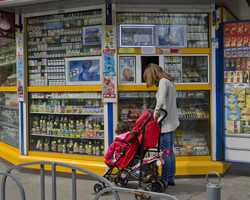New research grant will help to find best practices of tackling alcohol consumption in the Baltics

WHO/Malin Bring
A new international project "Evaluation of the impact of alcohol control policies on morbidity and mortality in Lithuania and other Baltic states" funded by the US National Institute on Alcohol Abuse and Alcoholism has been launched to investigate the effects of alcohol market regulations implemented in Lithuania, Latvia and Estonia. The research backed by WHO/Europe is designed for a 5-year work plan that can ultimately benefit all countries of the European Region, identifying the best practices that can help lower alcohol consumption and associated health harms.
The WHO European Region has the highest levels of alcohol consumption in the world, with almost 10 litres of pure alcohol per capita and the highest rate of alcohol-use disorders in the population and the lowest share of people abstaining from alcohol. As of 2016, 10% of all deaths that occurred on the Region here were attributed to alcohol. The same year the Baltic States - Lithuania, Latvia and Estonia - were found to have some of the heaviest drinking rates compared to other European countries. Alcohol consumption rates totalled 15, 12.9 and 11.6 liters of pure alcohol per capita, respectively. When considering current drinkers only (those who have consumed alcohol within 12 months before the poll), the numbers were even higher: 18.9, 17.2 and 15.9 liters of pure alcohol per capita.
Being aware of the situation, the US National Institute on Alcohol Abuse and Alcoholism (NIAAA) of the National Institute of Health (NIH) awarded a grant of nearly $2 million for a WHO-backed research project that will gather alcohol and health statistics and compare their trends against the backdrop of alcohol control practices among the Baltic States during the last decade. Here, a special focus will fall upon Lithuanian policies from 2016 to 2018 – these included important changes in alcohol consumption and the implementation of cost-effective alcohol policies in the country.
Lithuania experience: a valuable lesson
Lithuania’s experience is at the centre of this research for a specific reason. Its actions to control alcohol consumption can be called a ‘natural experiment’ with a wide range of measures implemented over a short period of time. In 2008-2009 Lithuania introduced a series of WHO ‘best buy’ policies - cost-effective interventions to reduce alcohol consumption and associated harms. The interventions consisted of increasing the price of alcoholic beverages, reducing the availability (e.g. limiting retail sale time) and limiting the alcohol advertising during the day time. The second overhaul of alcohol control policies came in 2014. In the following years, new measures included a ban on alcohol sales in petrol stations, a major increase in excise tax and other WHO-recommended fiscal regulations.
“Research on alcohol policy is developing fast. While we know that policies such as raising prices and taxes, and restricting marketing and availability are effective in reducing alcohol consumption, we must deepen our knowledge regarding what will also work with regards to neighbouring countries, and what levels of health and economic gains can be achieved,” said Dr Hans Henri P. Kluge, WHO Regional Director for Europe.
“The findings of this newly-launched project will help policy-makers to move from what – to understand how alcohol control policies are best implemented and enforced, as well as their impact on people’s health. This practical approach is fundamental to the new European Programme of Work, ‘United Action for Better Health in Europe’“, he added.
Early results
Already, some early results from this project have been received. The gathered data shows that the Lithuanian tax increase on alcoholic beverages entered into force in 2017 and had a positive impact on all-cause mortality. The policy resulted in 150 fewer deaths caused by alcohol the following year.
The next findings of the project will be presented and discussed at a series of expert workshops and conferences, as well as in peer-reviewed publications and media articles. Researchers will analyze a wide range data from Lithuania and other Baltic States related to alcohol consumption and subsequent health harms, including traffic accidents and levels of interpersonal violence.
The research is led by experts from the Centre for Addiction and Mental Health in Canada and the Health Research Institute of the Lithuanian University of Health Sciences, in association with researchers and institutions from Latvia and Estonia. WHO/Europe and its country offices in the Baltics are contributing to this challenging work.
Lessons learned from the "Evaluation of the impact of alcohol control policies on morbidity and mortality in Lithuania and other Baltic states" project will be important for all countries of the European Region and might have global implications. It is crucial to have the “real-world” data as a basis for theoretical models and responsible policies that will benefit future generations’ health and wellbeing.



